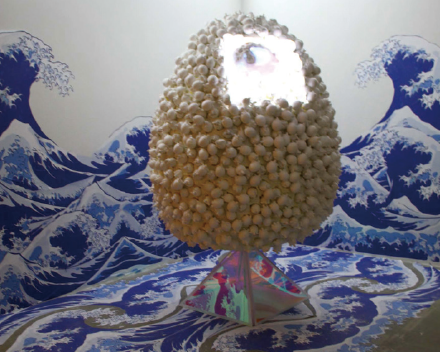Being uncomfortable in one’s own skin is an imminent passage from childhood to adulthood. But sometimes these perceptions become engraved in our identity, and the remnants of discomfort become part of our daily lives. Through the discontent of my own identity, I create masks. Masks are able to change, conceal, and bestow the bearer a new identity. Through these mask I narrate folklore and myths, divulging from Korean and Japanese culture. These stories reference gender ambiguity, racial hierarchy, self-dissatisfaction, and the remnants of childhood that lie within the core of one’s identity.
“100 drops of my mother’s tears” is based on a story my grandmother would tell me, particularly when I misbehaved. It is a fable about a turtle son and his turtle mother. The son would always do the exact opposite of what his mother would tell him. One day, the mother fell ill and asked her son to bury her body in the lowest part of the beach. As always, she expected him to do the opposite. But now, he obeyed his mother’s wishes. The next day he discovered that his mother’s body had washed away into the ocean. The moral is “you’ll be sorry once it’s too late.”
I collected my mother’s tears during a performance we did together. This performance required us to be together for an entire summer. This physical proximity forced my mother to confront the conflict between her religious faith and my sexuality. Every night my mother would pray for me during religious service. As she prayed, she cried uncontrollably. Witnessing her torment, I felt an extreme sense of guilt-guilt for my sexuality, guilt for my lifestyle, and, as her only son, the ultimate guilt of not meeting her expectations. To deal with my guilt, I started collecting the droplets of her tears, so that she would recognize my ignominy.

